Do you enjoy helping others? Are you organized, reliable, and have strong communication skills? Do you have a caring nature and a willingness to help others? If so, becoming a dental hygienist may be the perfect career for you. Dental hygienists work with other team members to ensure patients are healthy and their teeth remain clean and free of infection. Working as an hygienist requires dedication, compassion, and the ability to think on your feet. In addition to these essential character traits, it helps if you have a high school diploma or equivalent degree in another field. A dental hygienist resume isn’t difficult to create if you understand what employers are looking for when they read your resume. This article will help prepare you to apply for suitable positions in this field.
Dental Hygienist Resume Example
 Download This Dental Hygienist Resume as PDF
Download This Dental Hygienist Resume as PDF
Dental Receptionist Resume Example
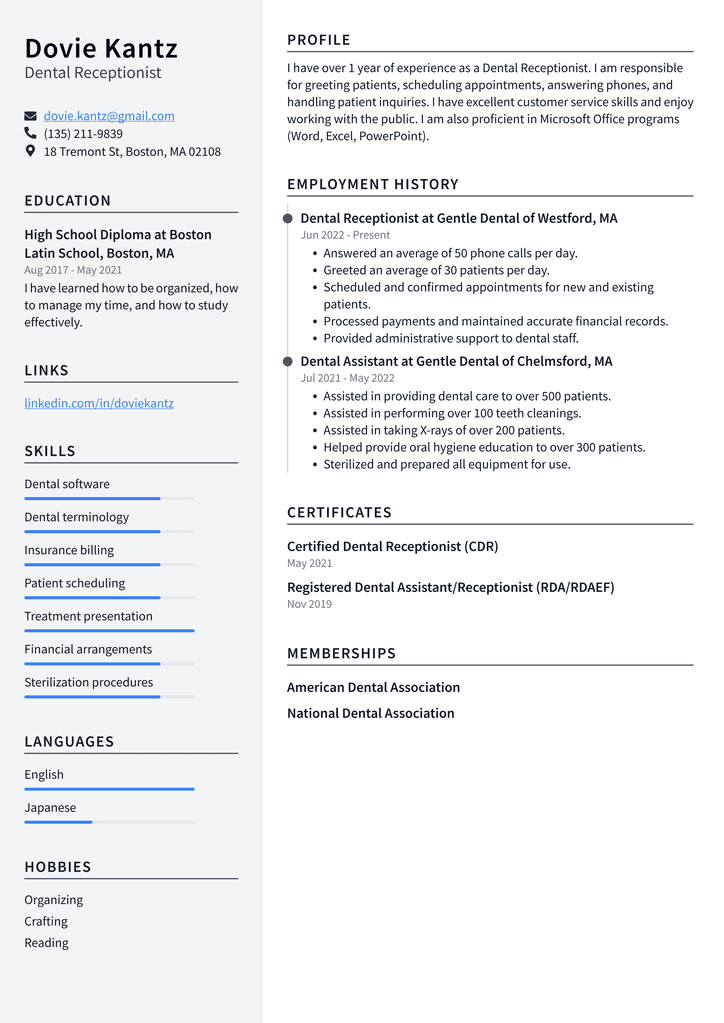
Download This Dental Receptionist Resume as PDF
Dental Assistant Resume Example
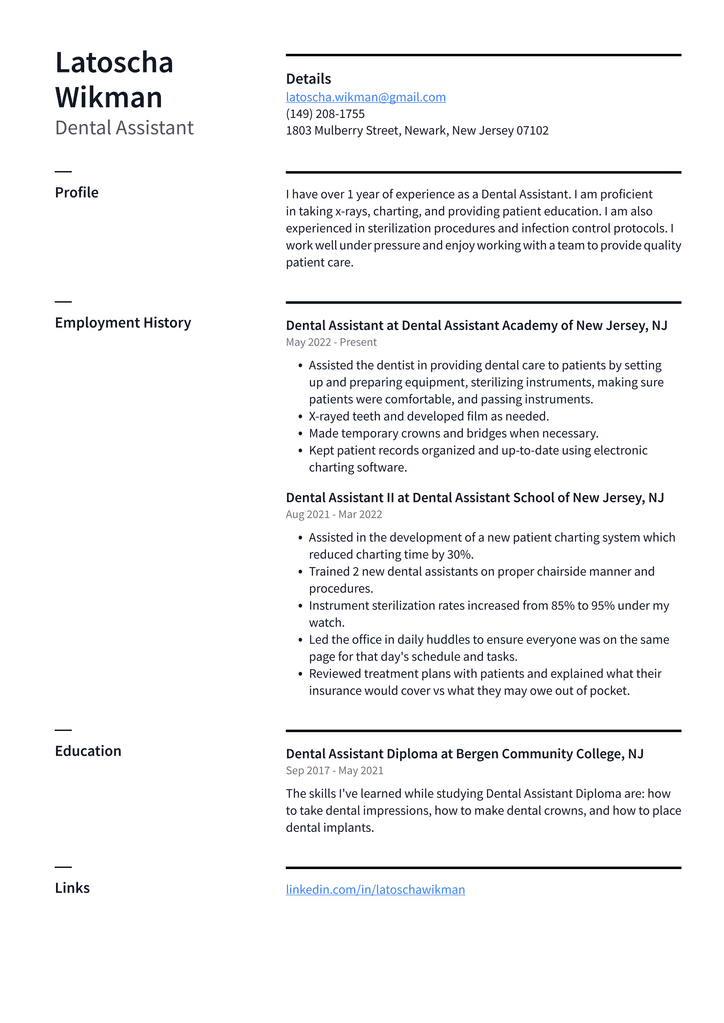
Download This Dental Assistant Resume as PDF
Dental Scheduler Resume Example
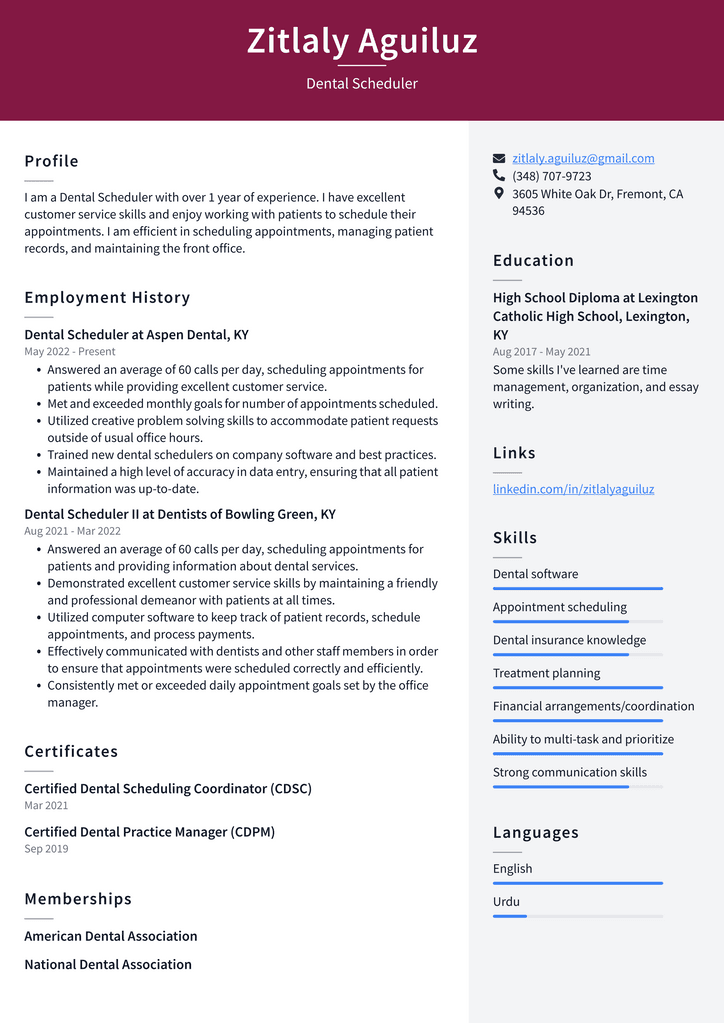
Download This Dental Scheduler Resume as PDF
Dental Biller Resume Example
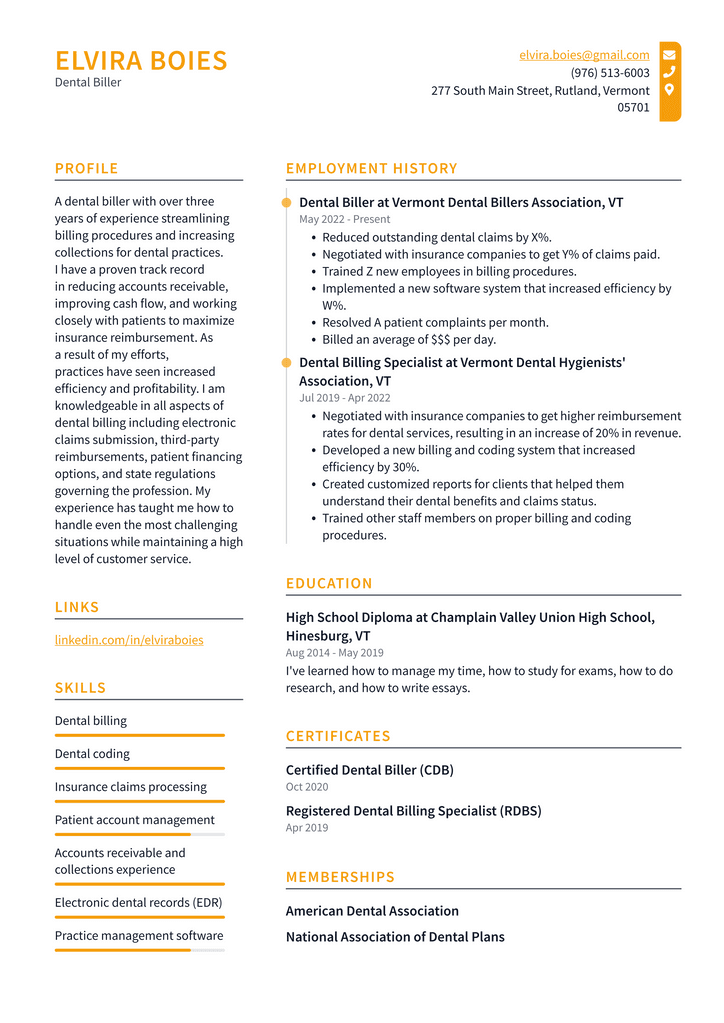
Download This Dental Biller Resume as PDF
Dental Office Manager Resume Example
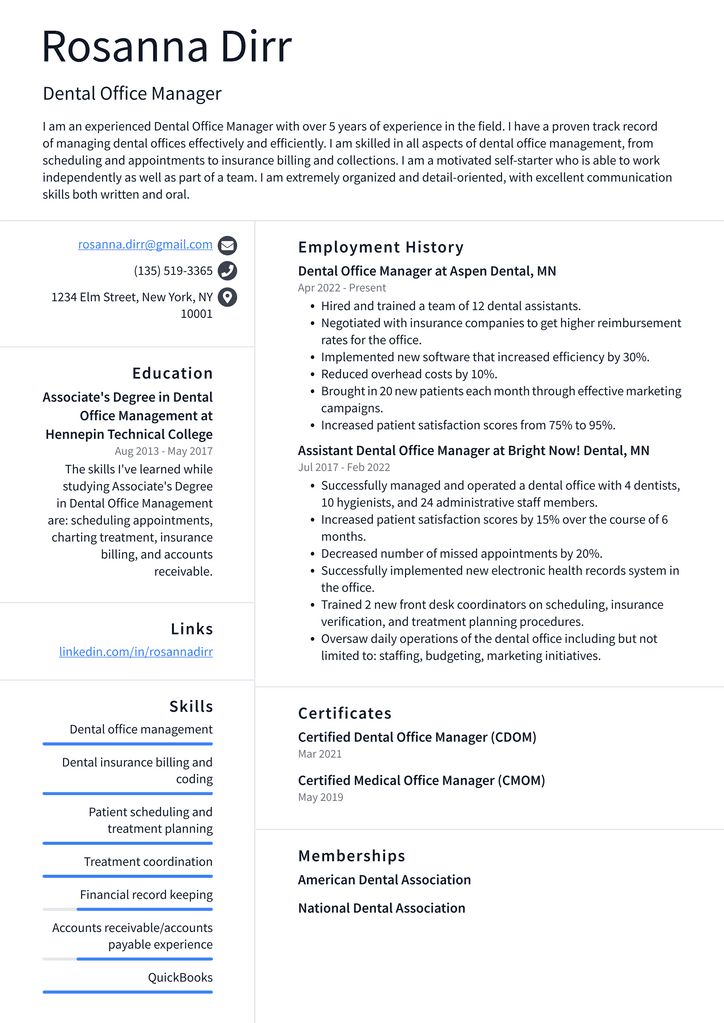
Download This Dental Office Manager Resume as PDF
Dental Treatment Coordinator Resume Example
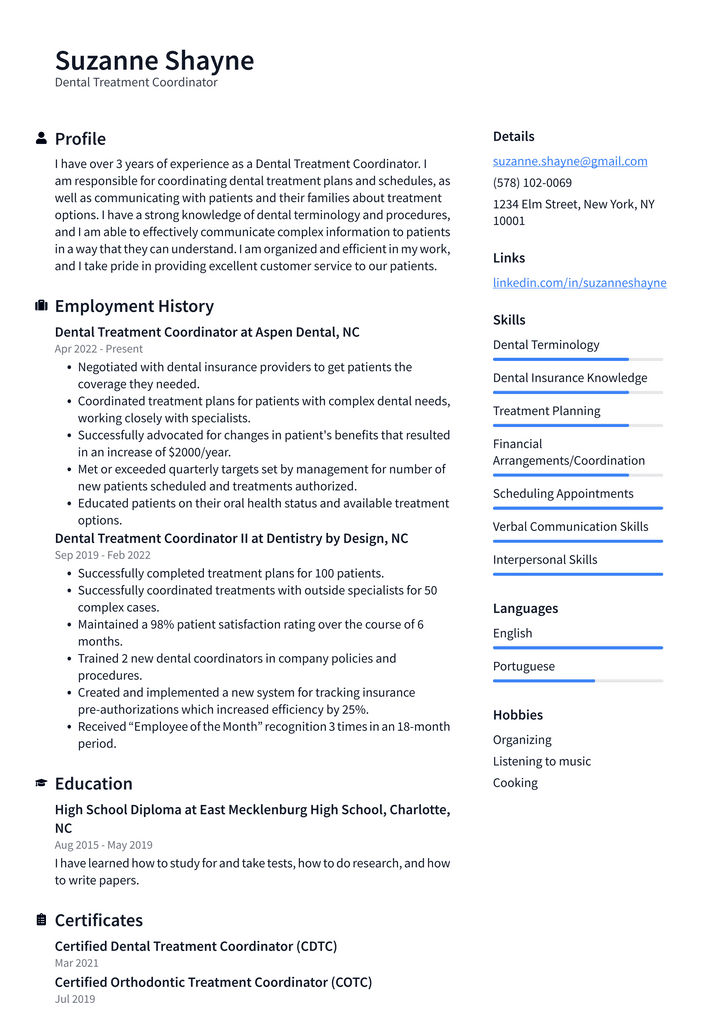
Download This Dental Treatment Coordinator Resume as PDF
What is a Dental Hygienist?
A dental hygienist is not a dentist; however, she does perform many of the same duties as a dentist. The primary responsibility for a dental hygienist is cleaning teeth to improve a patient’s oral health. Hygienists use a variety of tools to remove plaque and tartar from teeth. They may also take x-rays and perform tests to determine a patient’s risk of developing cavities. In order to protect their patients, hygienists use sterilized tools and wear gloves. They also may choose to use a face shield to protect themselves against any potential contact with blood or other bodily fluids. Hygienists take patients’ medical histories, conduct oral examinations, and make recommendations to dentists after each examination.
How to Become a Dental Hygienist
Hygienists must have a minimum of an associate degree from an accredited vocational school or a community college program. To become a dental hygienist, you will need to attend a dental hygiene program, which includes coursework in dental hygiene and dental assisting. The curriculum for this two-year program will include coursework in dental and medical terminology, anatomy, physiology, microbiology, nutrition, and oral pathology. You may also need to be licensed to practice in your state. The requirements to obtain a license will vary from state to state. Many states also require continuing education credits for license renewal.
Dental Hygiene Resume Tips
– Remember that an employer will be reading your resume and cover letter quickly. Employers only spend about six seconds reading your resume, so it is important that your resume have an engaging and compelling format. – Make sure the information on your resume is accurate and relevant. This means that you should tailor your resume to each position you apply for and include only the experience and skills that are directly relevant to the position. – Be sure to use a resume format that is easy to read and visually appealing. Select a resume format that reflects your personality and promotes your strengths. – Remember that your resume is your first chance to make a great impression on an employer. It is important that your resume reflects your education, skills, and experience. Your resume should highlight your strongest credentials. – Ensure that your resume includes the following: A summary statement: This is a few sentences about who you are and what your career goals are. This should be written in the first person and should be present tense. Education: Include your degree, the institution where you earned it, and the expected graduation date if you are still enrolled. Experience: Include any job experience that is relevant to the position you are applying for. Skills and abilities: Include any skills or abilities that are applicable to the position you are applying for. References: Include only if the employer requests this information. – Make sure to proofread your resume before submitting it to an employer. Make sure there are no grammar or spelling errors. Check the formatting and layout of your resume as well. – Be sure to tailor your resume to each position you apply for. – Include only the relevant experience and skills that are directly relevant to the position you are applying for. – Include information such as your name, address, phone number, email address, and any other information that is typically included on a resume. – Ensure that your resume includes the following: A summary statement: This is a few sentences about who you are and what your career goals are. This should be written in the first person and should be present tense. Education: Include your degree, the institution where you earned it, and the expected graduation date if you are still enrolled. Experience: Include any job experience that is relevant to the position you are applying for. Skills and abilities: Include any skills or abilities that are applicable to the position you are applying for. References: Include only if the employer requests this information.
The Importance of Good Communication Skills
Communication skills are essential in any job, but they are even more important in a job that involves working with patients and team members alike. If you are looking to become a dental hygienist, you will want to make sure that you make an effort to improve your communication skills. Communication is a critical skill because it impacts every aspect of your career. Communication skills will help you develop better relationships with your patients and other team members. Having strong communication skills will also enable you to be more efficient and productive on the job. To improve your communication skills, you should make a point to speak more frequently and be more assertive.
A Foundation in Chemistry and Math
Dental hygienists must have a strong foundation in chemistry and math. This is because many hygienists will work with chemicals when they are cleaning teeth and preparing materials such as rubber dam that must be placed over a patient’s teeth. The math skills come into play when hygienists must mix solutions or create charts that track patients’ progress. Hygienists must be well-organized individuals. They must know their way around a dental office and be able to prioritize tasks. This is important because hygienists must often balance cleaning teeth with meeting with patients and discussing treatment options. A hygienist must also be able to multi-task. Sometimes, this means that a hygienist must work with one patient while another patient is in the room.
Organizational Skills Are Also Essential
While hygiene skills are important, dental hygiene students must also be able to manage their time. Dental hygiene schools are often rigorous, and students must balance their classes with clinical hours. Exams and labs are typically held at the same time each day, and clinical hours change each week. Therefore, dental students must be able to manage their time effectively in order to succeed in the program. Organizational skills are important because they help you to be more efficient and productive. This is important because dental hygiene students typically have multiple responsibilities, just like dental hygienists. In order to succeed, you must be able to prioritize your activities and manage your time.
Conclusion
Dental hygienists must have a sweet personality and be caring. They must be willing to help others and be empathetic to patients’ needs. Becoming a dental hygienist is a career that involves a lot of hard work and studying. You must be willing to work with others and show compassion for patients. You must also be able to work in a fast-paced environment and be able to manage your time effectively.